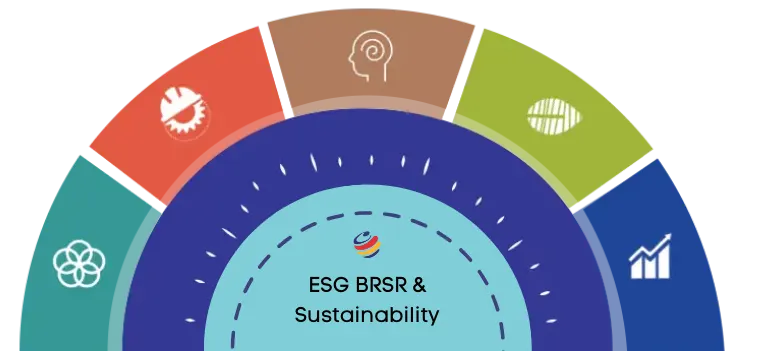Independent Audit Services
Explore Consultivo’s comprehensive independent audit services, designed to assess, certify, and ensure compliance with global ESG, sustainability, and safety standards.



Home / Audit and Assurance
Types of Independent Audits We Offer
Consultivo offers a wide range of independent audit services designed to assess compliance, identify risks, and ensure adherence to global standards.
Our audits include Gap Assessment Audits, Due Diligence Audits, and Third-Party Certification & Assurance Audits.
Gap Assessment Audits provide an in-depth “As-Is” assessment against key requirements such as global standards (GRI, TCFD, IS 14489, ISO 45001) or custom audit protocols. These audits help organizations identify gaps and improve compliance.

We provide third-party certification and independent assurance audits, ensuring compliance with national, international, and voluntary standards.
- Gap Assessment Audits
Gap Assessment Audits provide an in-depth “As-Is” assessment against key requirements such as global standards (GRI, TCFD, IS 14489, ISO 45001) or custom audit protocols. These audits help organizations identify gaps and improve compliance.
Gap assessments can be qualitative or quantitative, conducted as first-party (on behalf of the company), second-party (on behalf of the customer of a company), or third-party i.e. independent audits.
As-Is Assessment
Evaluation against audit criteria or custom checklists.
Compliance Audits
Audits focusing on statutory and regulatory obligations, aligned with local and international standards.
Due Diligence Audits
Consultivo specializes in Due Diligence Audits aimed at evaluating risk, compliance, and sustainability factors for Mergers & Acquisitions (M&A) and investment decisions. These audits provide critical insights into operational practices, ensuring informed decision-making.
B.
- Third-Party Certification & Assurance Audits
We provide third-party certification and independent assurance audits, ensuring compliance with national, international, and voluntary standards.
Accredited Audits
Recognized by national or international accreditation bodies.
Consultivo is accredited, enlisted and approved with different accreditation bodies/organisations. Few of them are:
- AA 1000 License
- PSCI
- CORE
- IFC
- Govt of Jharkhand
Unaccredited Audits
Conducted as a third-party independent body for non-certifiable standards.
Our Audit and Assurance Methodology
At Consultivo, we apply a structured, evidence-based approach to assess compliance, identify gaps, and recommend actionable improvements. Our methodology ensures comprehensive risk analysis, stakeholder engagement, and tailored solutions to help businesses meet their ESG, safety, and sustainability goals.
From planning and fieldwork to reporting and follow-up, we provide a transparent, independent audit process focused on measurable outcomes
Why Choose Consultivo for Independent Audits?
At Consultivo, we combine global expertise with localized knowledge to offer independent audit solutions tailored to your business needs. Our team of professionals ensures that your organization remains compliant, sustainable, and resilient in the face of regulatory, social, and environmental challenges.

We partner to offer independent services that help to reduce risk, streamline processes, and operate in a more sustainable manner.

GLOBAL Experience


750+ clients
in over 4 continents and 19 countries
2K+ projects
across the value chain
15+ years
at the forefront of ESG and Sustainability Advisory Space
Ensure every deal is built on a foundation of thorough, strategic due diligence.
Our expertise helps protect investments, enhance transaction value, and promote seamless post-acquisition integration.





Transforming businesses for a sustainable tomorrow.

Contact Us for Independent Audit Services
Looking for an independent audit to assess your business’s ESG, sustainability, or compliance performance? Contact Consultivo today to learn how we can help.
Choose from our range of audit, due-diligence, certification and assurance services

- Social & Sustainability
- Safety
- People Advisory – HR Audits
Consultivo’s Key Audit Areas
Our independent audits focus on five major solution areas across ESG and Sustainability domains:
Social & Sustainability Audits
Environment & Energy Audits
Safety Audits
People Advisory Audits
Business Excellence Audits
About Consultivo
Consultivo is one of the leading ESG Consultants in India
An Advisory, Research, Audit & Training organisation helping global businesses in the areas of Sustainability, Business Excellence & Risk Management both at the strategic and operational levels.
Major service verticals include Safety, Sustainability, Environment & Energy, CSR, Management Systems, Organisational Development and Human Capital Development. Consultivo works with 100+ National and International Sustainability related codes, standards and guidelines.
Apart from Independent External Assurance, as a leading ESG Consultant based in India, Consultivo offers ESG Materiality Assessment and Strategy Consulting, ESG Implementation Handholding, Stakeholder Mapping and Engagement, ESG, Sustainability and BRSR Report Preparation and ESG Report Design.
Consultivo Academy offers training and capacity building services both in conventional and new age e-learning platforms.
Speak to us or drop us a WhatsApp message


Let's discuss

Some more answers to your questions - FAQ
Questions? We have answers.
What Is Auditing?
Auditing is a process of verification, to ensure compliance to requirements.
An audit may cover an entire organizational process, system and activities or might be specific to a function, process, or production step.
Some audits have special purpose or focus, such as adequacy checks, compliance checks, strategic risk identification, system effectiveness & efficiency checks, performance, or following up on completed corrective actions.
What are First-Party, Second-Party, and Third-Party Audits?
Management Audit Types
- A first-party audit is performed within an organisation by their own personnel against a predefined scope and criteria.
A first-party audit is generally an internal audit conducted by auditors who are employed by the organization being audited but independent of the areas being audited.
- A second-party audit is an external audit performed on a supplier by a customer or their representative.
Generally, a second party audit is being carried out based on a contract and they tend to be more formal than first-party audits. The audit results generally influence the customer’s purchasing decisions.
- A third-party audit is performed by an independent audit organization and is free of any conflict of interest.
Independence of the audit organisation is a key component of a third-party audit. Third-party audits are generally used for certification, assurance, registration, recognition, etc.
Is there any standard for auditing management systems?
Standard for Management Audit or Management System Audit
ISO 19011:2018 is an international standard (guideline) for auditing management systems.
This document has defined principles of auditing, how to manage an audit programme and conducting management system audits.
Guidance on the evaluation of the competence of individuals involved in the audit process has also been defined here. These activities include the individual(s) managing the audit programme, auditors and audit teams.
It is applicable to all organizations that need to plan and conduct internal or external audits of management systems or manage an audit programme.
The application of this document to other types of audits is possible, provided that special consideration is given to the specific competence needed.
The Three Different Types of Audits
Management Audits can be broadly classified under the following categories:
Process audit:
This type of audit verifies the limits and controls of a process with a focus on the possible risks and their associated control measures. Process audit includes checking conformance, and availability of required resources.
They also check the adequacy and effectiveness of the process controls established by procedures, work instructions, flowcharts, and training and process specifications.
Process Safety Audit is an example of a process audit.
Product audit:
This type of audit is the verification of a particular product or service, to evaluate whether it conforms to requirements (i.e., specifications, performance standards, and customer requirements). It is an extension of inspection or conformity assessment.
System audit:
An audit conducted on a management system is called a system audit. It verifies the adequacy of the system, compliance, effectiveness and efficiency.
A quality management system audit or an environmental system audit is an example of Systems Audit.




